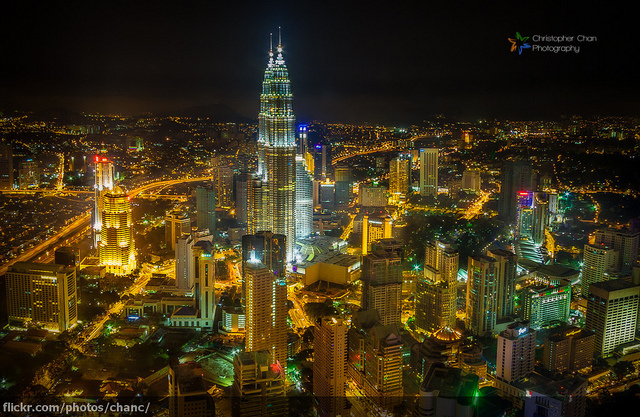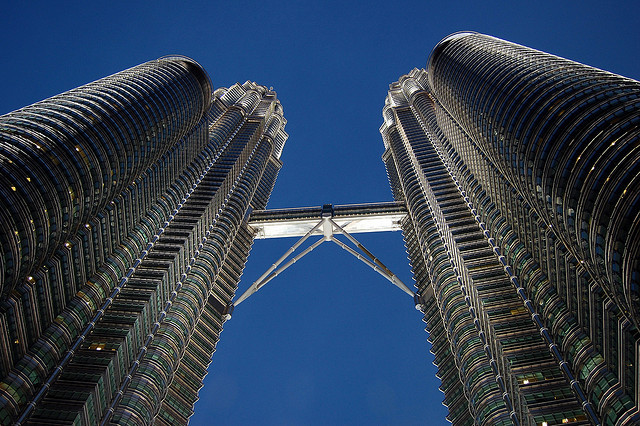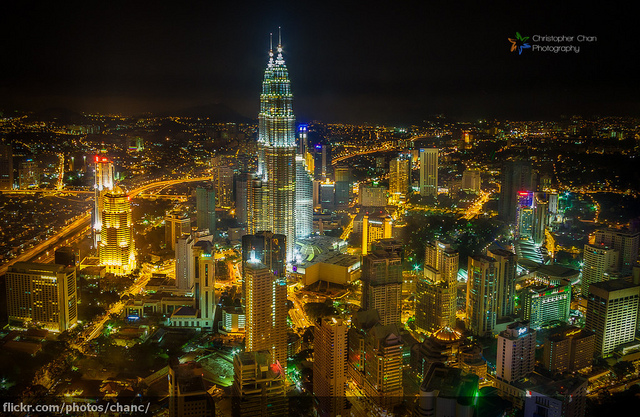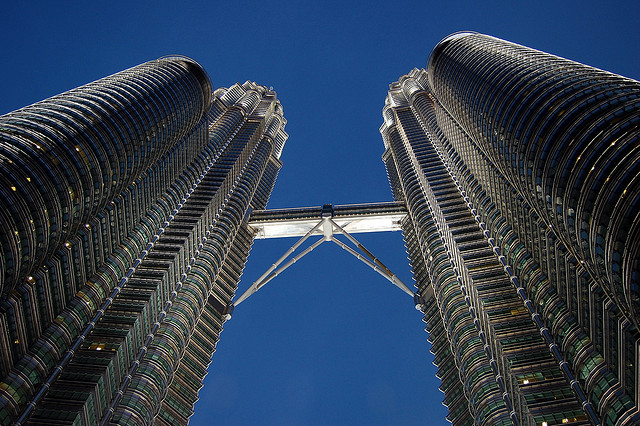Why do investors choose Malaysia?
It is important to note that multibillion foreign loans played the key role in Malaysian economy surge. But the investing of huge sums on country development does not mean the future prosperity of any country, and there are many examples of how the funds from abroad were "dissolving" somewhere on midway. The countries of the "third world" with monarchical systems are famous for corruption problems. Taking into account these facts, it seems to be that the Malaysian economy has been doomed to failure. However, money that came from overseas was not settled in the pockets of officials, but invested in the development of industries that are bringing the incomes to the country now.
The corruption level managed to be significantly reduced due to the unique state form of Malaysian government, and foreign investors come to the country being sure that their business is now protected by well-adjusted mechanisms of legal regulation.
Foreign direct investments in Malaysia in 2014 were equal to $ 10.9 billion. At the present stage foreign investments from 30 countries are registered in Malaysia.
However, the vast majority of investments (about 90% of their total amount) come from the UK, the US and Japan. The remaining portion of the investments comes from companies of Germany, France, Italy, Canada, Sweden, Switzerland, Denmark, Belgium, Norway and Australia, as well as companies of the neighboring states such as Singapore, Hong Kong, Thailand and others.
The most popular sectors among the investors are manufacturing (37,6%), mining, oil and gas sector (28,7%), finance and insurance (9,4%) (Bank Negara Malaysia, 2013). It's not surprising that manufacturing sector takes the largest part of investments, because it happens everywhere. But why does the investment in natural resources take the second place in Malaysia where the real estate market is very attractive and technological sector is well-developed?
The corruption level managed to be significantly reduced due to the unique state form of Malaysian government, and foreign investors come to the country being sure that their business is now protected by well-adjusted mechanisms of legal regulation.
Foreign direct investments in Malaysia in 2014 were equal to $ 10.9 billion. At the present stage foreign investments from 30 countries are registered in Malaysia.
However, the vast majority of investments (about 90% of their total amount) come from the UK, the US and Japan. The remaining portion of the investments comes from companies of Germany, France, Italy, Canada, Sweden, Switzerland, Denmark, Belgium, Norway and Australia, as well as companies of the neighboring states such as Singapore, Hong Kong, Thailand and others.
The most popular sectors among the investors are manufacturing (37,6%), mining, oil and gas sector (28,7%), finance and insurance (9,4%) (Bank Negara Malaysia, 2013). It's not surprising that manufacturing sector takes the largest part of investments, because it happens everywhere. But why does the investment in natural resources take the second place in Malaysia where the real estate market is very attractive and technological sector is well-developed?

Kuala Lumpur City Centre, Christopher Chan (Flickr / cc)
What’s about those natural resources?
Let's turn to the gas industry market. Malaysia's natural gas reserves are estimated at about 100 tscf (Trillions of standard cubic feet of gas), whereas gas production reaches 1,046 kboe/day (Malaysia: Natural Gas Industry Annual Review, 2014). The country's largest oil and gas company Petronas is considered to be one of the most influential in the region and is at the 69th place in the Fortune Global 500 rating (data 2014).
Despite rather good statistics, the situation in the country was represented in a fairly unattractive way till a certain time. The depletion of large deposits was a real threat to affect the industry. But with the discovery of new fields (e.g. Damar gas field near the east coast of Malaysian peninsula with the estimated capacity of approximately 5.7 million cubic metres (200 million cubic foot) of gas per day), the situation has improved.
Damar is being developed under the production sharing agreement between ExxonMobil, Petronas Carigali and Petronas. ExxonMobil acts as the project operator. A subsidiary of the US company ExxonMobil Exploration and Production Malaysia Inc. holds a stake of 50%. The remaining 50% is owned by Petronas Carigali.
As the president of ExxonMobil Development Company Neil W. Duffin noted, the success of the Damar deposit will assist in meeting the growing demand for natural gas in Malaysia, as well as will significantly expand overseas production potential of ExxonMobil.
The beginning of gas production at the field was preceded by the launch of another Malaysian field in March 2013 called Telok, where ExxonMobil is also the operator.
Despite rather good statistics, the situation in the country was represented in a fairly unattractive way till a certain time. The depletion of large deposits was a real threat to affect the industry. But with the discovery of new fields (e.g. Damar gas field near the east coast of Malaysian peninsula with the estimated capacity of approximately 5.7 million cubic metres (200 million cubic foot) of gas per day), the situation has improved.
Damar is being developed under the production sharing agreement between ExxonMobil, Petronas Carigali and Petronas. ExxonMobil acts as the project operator. A subsidiary of the US company ExxonMobil Exploration and Production Malaysia Inc. holds a stake of 50%. The remaining 50% is owned by Petronas Carigali.
As the president of ExxonMobil Development Company Neil W. Duffin noted, the success of the Damar deposit will assist in meeting the growing demand for natural gas in Malaysia, as well as will significantly expand overseas production potential of ExxonMobil.
The beginning of gas production at the field was preceded by the launch of another Malaysian field in March 2013 called Telok, where ExxonMobil is also the operator.

Petronas Twin Towers, Christian Juncker (Flickr / cc)
Flies in the ointment
On the course of its development, Malaysia is facing with different challenges such as partial dependence on oil and gas export and, as a result, weakening of its currency - ringgit. A loan payment of $560 million was delayed twice by the quasi sovereign wealth fund 1Malaysia Development (1MDB), and it was not very good for the country. Ecological problem is also one of the most significant ones. Malaysia, as a country with developed oil and gas industry, faces constantly with the problem of preserving the environment.
One of the ways out is to invest in the industry development and to search for new ways of solving the problems.
The catch is that the combined efforts of the Government and Malaysian companies are not enough to maintain the industry at the appropriate level. Having large number of problems to be solved is really not easy. And that's why the country's policy towards foreign investments becomes clear. Foreign partners not only provide a stable cash flow, but also help in solving some operational problems.
One of the ways out is to invest in the industry development and to search for new ways of solving the problems.
The catch is that the combined efforts of the Government and Malaysian companies are not enough to maintain the industry at the appropriate level. Having large number of problems to be solved is really not easy. And that's why the country's policy towards foreign investments becomes clear. Foreign partners not only provide a stable cash flow, but also help in solving some operational problems.
Anybody else?
As mentioned above, about 90% of all investments to Malaysia come from the UK, the US and Japan. These are the giants, whose contribution is extremely difficult to outweigh. And, in fact, Malaysia is a strategic partner for some of them. But what about the other investors? Let's take France as an example. In 2013, the Malaysian newspaper The Star reported France to be one of the most important international partners of the country today.
It's confirmed by the fact that there was a plant producing components for aircraft in Sendayan, Negri Sembilan. In this regard, Prime Minister Datuk Seri Najib Tun Razak considered the investments as a proof of good relationships between the two countries, reported The Star. According to his words, France made investments in the sum of $135 million for manufacturing carbon discs for aircraft brakes to be distributed in Asian countries.
“Then we have the biotech investment in Terengganu between Arkema of France and CJ CheilJedang of South Korea. These are two significant investments and we look forward to receiving more from French investors,” he reported.
Having visited Malaysia, French Prime Minister at the time Jean-Marc Ayrault admitted then that France was eager to assist Malaysia in becoming a well-developed country by 2020.
- Malaysia is France’s second largest economic partner in Asean and there are some 260 French companies here. They are ready to support all the projects to help Malaysia achieve the developed status by 2020, he said.
Ayrault also noticed that another aim of his coming to Malaysia was to explore the new options for both small and medium French companies working in such spheres as infrastructure, information and communication, and sustainability.
Some time before, the Prime Ministers of both countries signed the three memoranda of understanding (MoU).
So, despite the vast geographical distance, France and Malaysia are now successful economic partners. This is confirmed not only by official visits, but also, as mentioned above, the presence of French investing companies in the market, which make contribution to the development of the country. For example, the French Veolia, which is the world's leading operator in the field of water management, has already six offices in Malaysia.
Patrick Couzinet, Business Development Director at Veolia Water Technologies, comments:
- “Our early presence in Malaysia helped us understand the recent history and the culture that underpin its economic development today. Malaysians are particularly attached to environmental protection, since they became aware of ecological risks related to industrialization. Last year for example, Veolia entered a 20-year partnership with 1MDB concerning the prestigious Tun Razak Exchange Project, within which we aim to recover at least 80% of expected sewage generated. Finally, we’ll contribute to cut site-wide fresh water demand by half.”
Dato’ Haji Azmar Talib, the CEO of Tun Razak Exchange, confirms :
- “TRX is committed to sustainability and we are proud to undertake this with a strong, reputable partner. This is in line with efforts to improve treatment practices for waste water towards achieving the Greater KL goals which the Government has outlined. This partnership with Veolia is a key component in achieving world-class sustainability in Malaysia. It will also be economical for tenants, demonstrating that sustainability doesn’t always have to be expensive.”
It's confirmed by the fact that there was a plant producing components for aircraft in Sendayan, Negri Sembilan. In this regard, Prime Minister Datuk Seri Najib Tun Razak considered the investments as a proof of good relationships between the two countries, reported The Star. According to his words, France made investments in the sum of $135 million for manufacturing carbon discs for aircraft brakes to be distributed in Asian countries.
“Then we have the biotech investment in Terengganu between Arkema of France and CJ CheilJedang of South Korea. These are two significant investments and we look forward to receiving more from French investors,” he reported.
Having visited Malaysia, French Prime Minister at the time Jean-Marc Ayrault admitted then that France was eager to assist Malaysia in becoming a well-developed country by 2020.
- Malaysia is France’s second largest economic partner in Asean and there are some 260 French companies here. They are ready to support all the projects to help Malaysia achieve the developed status by 2020, he said.
Ayrault also noticed that another aim of his coming to Malaysia was to explore the new options for both small and medium French companies working in such spheres as infrastructure, information and communication, and sustainability.
Some time before, the Prime Ministers of both countries signed the three memoranda of understanding (MoU).
So, despite the vast geographical distance, France and Malaysia are now successful economic partners. This is confirmed not only by official visits, but also, as mentioned above, the presence of French investing companies in the market, which make contribution to the development of the country. For example, the French Veolia, which is the world's leading operator in the field of water management, has already six offices in Malaysia.
Patrick Couzinet, Business Development Director at Veolia Water Technologies, comments:
- “Our early presence in Malaysia helped us understand the recent history and the culture that underpin its economic development today. Malaysians are particularly attached to environmental protection, since they became aware of ecological risks related to industrialization. Last year for example, Veolia entered a 20-year partnership with 1MDB concerning the prestigious Tun Razak Exchange Project, within which we aim to recover at least 80% of expected sewage generated. Finally, we’ll contribute to cut site-wide fresh water demand by half.”
Dato’ Haji Azmar Talib, the CEO of Tun Razak Exchange, confirms :
- “TRX is committed to sustainability and we are proud to undertake this with a strong, reputable partner. This is in line with efforts to improve treatment practices for waste water towards achieving the Greater KL goals which the Government has outlined. This partnership with Veolia is a key component in achieving world-class sustainability in Malaysia. It will also be economical for tenants, demonstrating that sustainability doesn’t always have to be expensive.”
Fruitful efforts
It is obvious that the country's efforts are already delivering some great benefits, which can be inferred by the statements made by the Minister of Economic Planning of Malaysia Abdul Wahid Omar. He stated that Malaysia could achieve its goal of becoming a developed country for six years or even earlier, as the growing private investments compensated any decrease in public spending (October 2014).
In 2010, Prime Minister Najib Razak announced a plan, known as the "Program of economic reforms", to attract $ 444 billion of local and foreign investments by 2020, starting with oil storage tanks and ending with the metro in Kuala Lumpur.
Yet the third-largest economy in South-East Asia is ahead of its neighbors because of economies growth rate reduction in Indonesia and Singapore in the last quarter.
- This country is one of the flagships, one of the few economies showing progressive growth," - said Crystal Tang, an analyst from the Singapore unit of Capital Economics Ltd.
In 2010, Prime Minister Najib Razak announced a plan, known as the "Program of economic reforms", to attract $ 444 billion of local and foreign investments by 2020, starting with oil storage tanks and ending with the metro in Kuala Lumpur.
Yet the third-largest economy in South-East Asia is ahead of its neighbors because of economies growth rate reduction in Indonesia and Singapore in the last quarter.
- This country is one of the flagships, one of the few economies showing progressive growth," - said Crystal Tang, an analyst from the Singapore unit of Capital Economics Ltd.



















